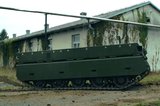Lockheed’s MHTK in new test firing
Lockheed Martin's Miniature Hit-to-Kill (MHTK) missile has been tested at White Sands Missile Range, New Mexico, to demonstrate the interceptor’s increased agility, the company announced on 30 January.
The test also validated the performance of MHTK’s airframe and updated electronics, which are now common between the missile's two configurations: active and semi-active seeker.
The missile's increased agility enhances the interceptor’s ability to defeat rocket, artillery and mortar targets with greater accuracy, reliability and range.
The MHTK interceptor is less than 2.5ft in length and it weighs about 5lbs at launch. It uses hit-to-kill technology, which destroys threats through an accurate application of kinetic energy in body-to-body contact. Hit-to-kill technology eliminates the incoming threat while reducing the risk of collateral damage seen in traditional blast-fragmentation interceptors.
Tim Cahill, vice president of Integrated Air and Missile Defense at Lockheed Martin Missiles and Fire Control, said: ‘The design of the MHTK interceptor enables a highly effective solution in a very compact package. This test is exciting because it is another successful milestone demonstrating the interceptor's revolutionary capabilities. We look forward to building on this success.’
More from Land Warfare
-
![World Defense Show 2026: Hanwha increases Middle East presence and reveals Tigon 6x6 sale]()
World Defense Show 2026: Hanwha increases Middle East presence and reveals Tigon 6x6 sale
Shephard sat down with Hanwha Middle East and Africa president Sung Il at World Defense Show 2026 to hear about the company’s plans for the region and how it plans to use local industry success to win deals.
-
![Estonia builds Asia-Pacific links as it looks to scale defence industry capabilities]()
Estonia builds Asia-Pacific links as it looks to scale defence industry capabilities
Collaboration between Estonian defence companies and well-aligned firms in Asia-Pacific will form a key part of Tallinn’s ambitions to significantly grow its defence industrial base.
-
![World Defense Show 2026: DOK-ING working on MV-8 variants and reveals specs ahead of Eurosatory]()
World Defense Show 2026: DOK-ING working on MV-8 variants and reveals specs ahead of Eurosatory
The Croatian company began the development of the MV-8 modular uncrewed platform in the early 2020s. Specifications for the vehicle were revealed to Shephard at World Defense Show 2026.
-
![World Defense Show 2026: Turkish and European industries will cooperate, says Aselsan boss]()
World Defense Show 2026: Turkish and European industries will cooperate, says Aselsan boss
Aselsan was formed 50 years ago in response to difficulties Turkey was facing in sourcing major systems internationally. While some challenges still remain, company president Ahmet Akyol believes a rapprochement is possible.
-
![World Defense Show 2026: MARSS displays new Nation Shield air defence C2 system]()
World Defense Show 2026: MARSS displays new Nation Shield air defence C2 system
Nation Shield is the latest iteration of the MARSS C2 system and is designed to provide C2 further forward along with more capable air defence.






















